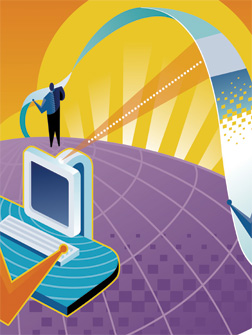 Wisconsin
Lawyer
Wisconsin
Lawyer
Vol. 81, No. 7, July
2008
Paperless Courts: E-Filing in Wisconsin Circuit Courts
On July 1, a rule setting out
procedures for filing
circuit court cases electronically took effect. E-filing
will debut county-by-county as circuit court judges and clerks
implement the procedures. Here's what you need to know
to take full advantage of this process when it becomes
available in your county.

by Jean Bousquet & Marcia Vandercook
Sidebar:
 lectronic filing (e-filing) is on
its way to the Wisconsin circuit courts.
On May 1, 2008, the Wisconsin Supreme Court approved a rule setting out
the
procedures for filing circuit court cases electronically, codified as
Wis.
Stat. section 801.17.1 Over the next few
years, e-filing will become available
county by county as clerks of circuit court and judges implement the new
procedures. E-filing is voluntary both for lawyers and litigants.
Director of
State Courts John Voelker has been a strong supporter of implementing
technology throughout the judicial branch. "We have now tested our
e-filing system for
two years, using small claims cases in Washington and Kenosha counties,
and
we've been very pleased with how it has performed. We're confident that
e-filing
will be an efficient, secure, and cost-effective way to streamline the
way
courts handle documents."
lectronic filing (e-filing) is on
its way to the Wisconsin circuit courts.
On May 1, 2008, the Wisconsin Supreme Court approved a rule setting out
the
procedures for filing circuit court cases electronically, codified as
Wis.
Stat. section 801.17.1 Over the next few
years, e-filing will become available
county by county as clerks of circuit court and judges implement the new
procedures. E-filing is voluntary both for lawyers and litigants.
Director of
State Courts John Voelker has been a strong supporter of implementing
technology throughout the judicial branch. "We have now tested our
e-filing system for
two years, using small claims cases in Washington and Kenosha counties,
and
we've been very pleased with how it has performed. We're confident that
e-filing
will be an efficient, secure, and cost-effective way to streamline the
way
courts handle documents."
What are the benefits for law firms?
For law firms, electronic filing offers a quick and easy way to file
cases
and receive documents. Many aspects of the e-filing system are modeled
after the federal courts' e-filing system. The
consolidated court automation programs (CCAP) is creating a separate Web
site, at
http://e-filing.wicourts.gov, to
process electronically filed documents. An attorney can
file documents through the court e-filing Web site without leaving the
office. Whenever a
new document or order is filed by other parties or the court, the law
office will receive
an email indicating that the document is available to be immediately
viewed and downloaded.
Lawyers and parties benefit by avoiding some of the costs of
printing, postage,
courier services, and file storage associated with paper documents.
Pleadings can be signed
by the lawyer using an electronic signature, and filing fees can be paid
with a credit
card. Lawyers will be able to access complete court files for their own
cases 24 hours a
day. Self-represented litigants also may register to use the system.
Litigants who are
represented by counsel will continue to file and receive documents only
through counsel
and will not be users of the Web site.
Rausch, Sturm, Israel & Hornik in Milwaukee volunteered to
file small claims
collections actions electronically as part of the pilot project.
"Through e-filing, we
believe we have better control over case management by knowing exactly
when our cases will
be filed, rather than relying on the mail," reports attorney
Gregory Enerson. "We also
like being able to see the whole court file online," he said.
"The clerk's office in
Washington County has been a good partner in fine-tuning the system and
working out any
glitches. It's become a pretty streamlined process, and we're happy we
were part of the
pilot project.
"When e-filing first became available in federal bankruptcy
court, I think there
was some resistance to this new procedure. Now, the vast majority of the
users love the
bankruptcy e-filing system. I think it's going to go the same way for
e-filing in the
circuit courts."
What are the benefits for the courts?
For the circuit courts, e-filing will reduce the time dedicated to
data entry and
improve accuracy, because case information is downloaded from the Web
site directly into the
CCAP case management system. Court employees will not need to enter case
information,
handle fees, or mail notices and documents. Any paper documents received
will be scanned
to create an all-electronic file, saving the time and money needed to
open, transport,
and store paper files. Clerks will have the option of maintaining paper
files for
e-filed cases, but they will not be required to do so.
Kristine Deiss, Washington County Circuit Court clerk, has been
participating in
the pilot project since 2005. "The system is very user friendly
from our perspective.
The ability of the system to automatically populate data from the
e-filed documents into
our case management system is wonderful. The civil clerk, the accounting
supervisor,
the judicial assistant, and the judge can all access an electronic file
for information
at the same time. Staff can easily bring the case up and review all
documents on their
computer monitor, or quickly print a copy when requested.
"E-filing also helps to address another major challenge for
the courts - dealing
with the tons of paper produced by modern litigation and the high cost
of storage.
Simply stated, it makes sense to store that data online, with access as
simple as a point
and click of a computer mouse."
In Kenosha County, Court Commissioner John Plous hears initial
returns of all
small claims cases. He has a computer at his bench and reviews the
electronic documents as
he hears each case and makes his determinations. "We bring all the
cases up on my
courtroom computer before court starts, which allows us to move rapidly
between cases. Each
document is easily accessible and identifiable in the e-filing system,
making it easier
to review documents and move between them than to page through a paper
file. The
clerks don't have to pull and assemble paper files to bring to court,
and I no longer
have stacks of paper files on the bench." He uses an electronic
signature to sign orders
and judgments. When a case is concluded, the clerk disposes of the case
and the
e-filing system posts all the documentation to the e-filing Web site.


Jean Bousquet is chief information officer of
the Wisconsin court system and oversees development of the court
e-filing Web site. Marcia Vandercook, Berkeley 1978, is
circuit court legal advisor and staff to the committee that drafted the
e-filing rule.
Is the system reliable and secure?
Reliability and security are paramount considerations for any
electronic filing
system, and on these measures the Wisconsin system has performed well.
More than 1,000
small claims money judgment cases have been electronically filed in
Washington and
Kenosha counties since 2005, and there have been no problems with
pleadings sent to the
wrong place, untimely filings, lost documents, or notices not being
received. If problems
were to occur with certain technical aspects of the system,
discretionary relief would
be available under the e-filing rule.
As far as security, CCAP is relying on digital signature
technology to ensure
the authenticity and integrity of electronically filed documents. A
digital signature is
not actually a signature; it is a method of encrypting information and
permanently
attaching it to the filed document. By locking down a document at the
moment it is accepted
by court staff, and by storing that document in a secure database, CCAP
will be able
to maintain original documents in the case management system without
fear that the
documents might later be altered.
When will e-filing become available?
Although the court rule became effective July 1, 2008, it could take
several years for
e-filing to become widely available throughout the state. Just as clerks
and judges
adopted the CCAP case management system county by county, so too will
e-filing be available
for local adoption. E-filing requires intensive scanning of documents,
and so clerks
will need to balance the front-end cost of scanning and office
reorganization against
the longer-term efficiency of all-electronic files. Judges and court
commissioners will
vary in their enthusiasm for new technology, as will local attorneys.
In addition, implementing e-filing requires a considerable
commitment of CCAP's
programming resources, so CCAP will provide e-filing only for civil,
family, and
small claims cases, (but temporary restraining orders injunctions, and
paternity cases will
not be available until CCAP completes further programming
work). Implementing e-filing for criminal and juvenile cases will
take longer because of the need to incorporate
interfaces with the large institutional case management systems of the
district attorneys,
public defenders, and other agencies.
The e-filing Web site is expected to be up and running by July
15, 2008, at
http://e-filing.wicourts.gov. It
will provide information about which counties are currently
accepting e-filed cases and which case types are available. It will
include
comprehensive instructions, help features, frequently asked questions,
technical requirements,
and training videos. As e-filing is adopted in each county, training
will be provided
to local lawyers and their employees and other persons on how to use the
system. CCAP
expects to enhance and expand the e-filing system over the years in
response to
customer needs and preferences. An e-filing system for the appellate
courts also is under
consideration. E-filing will not be available in Portage County, the
only county that has
not implemented the CCAP case management system.
What if a party doesn't want to file electronically?
Use of the e-filing system is voluntary. Lawyers may use it for a
single case, all
of their cases, or not at all. If an attorney chooses not to participate
electronically, there is one part of the e-filing rule that will affect
the attorney if another
party files electronically: Because the clerk is permitted to keep
all-electronic files,
the rule allows the clerk to discard documents after they have been
scanned and
properly saved in the CCAP case management system. Therefore, all
parties in an e-filed case
will submit copies to the court and keep the original documents in case
the authenticity
of the document or signature is called into question. In non-e-filing
cases, the
parties will continue to submit original documents.
Kristine Deiss says she is both realistic and optimistic about
the future of
e-filing in circuit courts. "We know that some attorneys and judges
will embrace e-filing
and others will insist on continuing to use paper. But the more we use
electronic files,
the more we [will have ease of access, the efficiencies created when we
open and process
a case, the ability to quickly respond to inquiries, and the space to
house staff
rather than accommodate more paper files."
Endnotes
Wisconsin Lawyer
